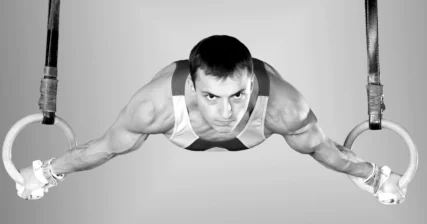If you were to ask the average person, or even the average healthcare practitioner, “What is the most important form of exercise?” the majority would respond with “Aerobic exercise,” like walking or running.
That never made sense to me. Such antiquated advice doesn’t match up with scientific evidence, a basic understanding of exercise physiology, or my experience from the past two decades.
Researchers in a recent meta-analysis examined the evidence for heart health benefits from strength training.
This was their conclusion:
In conclusion, this systematic review demonstrates that short-term RET (resistance training) improves CRF (cardiorespiratory fitness) in healthy older adults, based on evidence using multiple measures of this health-related parameter. This finding, combined with the already established evidence base that RET improves muscle mass and function, suggests that RET should be an integral aspect of exercise promotion for an ageing population. Further, that ‘lack of time’ is a commonly cited barrier to exercise in older adults and that older adults commonly face time-limited clinical pathways where improvements in physiological resilience have been shown to be beneficial (i.e. surgical prehabilitation), RET may be able to elicit benefit in two key components of whole body health (i.e. muscle and CRF) in older adults.
Smart TFF, et al.
I’ll break this down in more simple terms below.
Warning: Don’t Live Like Everyone Else
Though people live longer today than they have for much of human history, the average American lives the last 20% of their life with poor health. Most of that poor health comes from poor lifestyle and dietary choices during the other 80% of their life.
You wouldn’t be reading this if you didn’t care a little bit about where your health is headed. But just reading information like this won’t protect you. You have to act on it. And in acting on it, you need to make the choices that actually make a difference, not the choices that are popular with celebrities or based on agendas or alternative ideologies.
I won’t get lost in a tangent of nutrition and lifestyle nonsense, as our focus here is on identifying the best type of exercise to improve cardiovascular health.
Why does your choice of exercise matter?
Most of us aren’t professional or Olympic athletes, bodybuilders, or models, where our jobs are to be fit and athletic. In the real world, we have a very small amount of time to exercise each week. That means the time we do exercise has to produce the most benefit.
Though aerobic exercise does enhance heart health and may lead to lower body fat, it comes at a cost. I covered these costs in my post How Too Much Cardio or Endurance Training Is Bad For You. Excess cardio:
- Causes muscle and bone loss
- May lower thyroid function
- Can increase cortisol
- May lead to repetitive use injuries
- Could increase inflammation
- Compromises gut barrier function
- May lower testosterone
“But,” you may wonder, “if it makes your cardiovascular system stronger, isn’t that a positive tradeoff?” You only have one heart, and without it, you’re dead.
According to a recent study, only 7% of American adults have optimal heart and metabolic health.
So, if there were no other way to improve cardiovascular function, it would be a favorable tradeoff.
As we already read from the meta-analysis’ conclusion, strength training also improves cardiovascular health, and does a lot more for your health on top of it. Stuff that cardio cannot do.
So, if your time is limited and you are serious about your heart health, you’ll prioritize strength training over cardio. By strength training, I’m referring to muscle-building workouts, not fast-paced, high-intensity cardio that looks like weight training.
Read also: Strength Training Before or After Cardio? Find Out Now.
Why Weight Training is More Important Than Aerobic Exercise for Cardiovascular Health
To be clear, I’m not suggesting that everyone avoid doing cardio. There are some instances when it’s very appropriate, such as in overcoming adrenal fatigue, managing PCOS, prepping for a physique contest, or training for an aerobic event. I even utilize cardio regularly in my VIGORESS programming as it’s designed mainly for women.
What I am suggesting is that weight training always takes priority over aerobic exercise, since you can gain most of the benefits from aerobic exercise through a good strength training program, but you cannot get many of the benefits of strength training by doing cardio.
Weight training builds muscle, and muscle:
- stores carbohydrates (as glucose)
- increases metabolic rate
- helps you maintain insulin sensitivity
- becomes a source of amino acids when dealing with severe illnesses that lead to cachexia or sarcopenia
- adds integrity to your joints
- helps you move and look better
Strength training also improves coordination, balance, and reflexes.
It stimulates the release of hormones like testosterone and growth hormone.
Your level of muscle mass has a direct effect on longevity. The more you have, the longer you’ll live (all else being equal).
Resistance training also improves bone density and sleep quality.
All the while, weight training also improves cardiovascular health.
Read also: Can you lose weight without cardio?
A Few Caveats Before You Head to the Gym
Some people believe a weight training workout involves picking a machine for each body part, doing a few sets on each machine until they get uncomfortable, and then heading home.
The FITT principle, which I learned way back in my college freshman year, is as important and relevant today as ever.
- Frequency: You must train often enough to continue stimulating your body to change. Middle-aged adults usually do best with four training sessions per week. Because older adults get less of a stimulus from their workouts (and the protein in their diet), a term called “anabolic resistance,” they need to train more often than middle-aged or younger adults but with less intensity.
- Intensity: To make progress, you must push yourself harder over time, which means the weight you use should continue going up. My clients track their training sessions in our app. When you can see what you did previously, you know what you’ll need to do today to continue progressing.
- Time: A 15-minute workout won’t do much for you, unless you’ve been doing nothing. I’m sure someone is selling a program right now that makes you think 15 minutes is enough. It isn’t. Your workouts will take 45-60 minutes.
- Type: Resistance training or resistance training plus cardio is find. Just avoid only doing cardio. Doing only cardio isn’t good for you.
Of course, you’ll need to follow a healthy, high-protein diet, take some foundational supplements, and get sufficient sleep, too. None of this is as complicated as fitness “gurus” or “experts” would have you believe.
In fact, I’ll show you how simple it can be if you join my online training program, VIGOR Training. Your heart and the rest of your body will be grateful.
Photo by Bastien Plu on Unsplash



